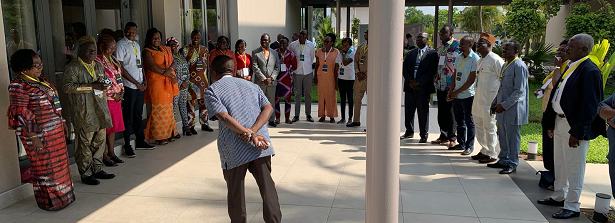Scaling for impact: strengthening Benin Food & Nutrition Security in policy and practice

During a three-day workshop in Cotonou end November 2019, all Applied Research Fund (ARF) projects of NWO-WOTRO in Benin got together. Since these projects are finished or almost finalised, it was time to take stock of their outcomes, share lessons learned, and tackle issues related to scaling-up of project results. The overall theme was “Scaling for Impact : ARF results for strengthening Benin Food & Nutrition Security in policy and practice”.
The three day workshop took place from November 20 to 22, 2019 in Cotonou, Benin, and was jointly organised by NWO-WOTRO Science for Global Development, the Food & Business Knowledge Platform (F&BKP), the Laboratory of Food Sciences of the University of Abomey-Calavi (LSA/UAC), and AgriProFocus Benin (APF).
During the workshop, representatives of all eleven projects of the Applied Research Fund (ARF) of NWO-WOTRO in Benin got together. Since these projects are finished or almost finalised, it was time to take stock of their outcomes, share lessons learned, and tackle issues related to scaling-up of project results. The workshop encompassed a project day gathering all project representatives, a public dialogue whereby external Beninese stakeholders were invited, and a field visit to the sites of the ARF project entitled ‘Agronomic and processing practices for pineapple in Benin (DAPIS)’.
ARF projects day
During the project day, ARF projects implemented in Benin shared and discussed the numerous practical results that were co-created by practitioners, private sector and research. Often at the end of project interventions, outcomes are not scaled up and impact becomes limited. To avoid this, the ARF projects projects were designed not just for producing evidence of what works, but also for ensuring that successful ones could be scaled and become profitable. Therefore, participants discussed the prerequisite conditions, from both policy and practice, for scaling-up ARF projects to reach food and nutrition security. These conditions are :(i) a favorable political environment, (ii) an institutional arrangement that links food and nutrition security specialists with farmers, (iii) the development of innovations centred on endogenous resources, (iv) a project and political embedment of the scaling -up process, (v) a solid and sustainable partnership between the actors of innovation development, and (vi) the development of innovation platforms that link the private and the public sector around innovation development. During this workshop, governmental organisations in charge of agriculture showed institutional engagement to support the scaling up of results and innovations to the extent that they will contribute significantly to the achievement of the goals of the governmental action plan.
Public dialogue
During the public dialogue, all key actors of research action for development in food and agricultural fields in Benin gathered. Their discussion around the ARF projects’ outcomes and strategies for scaling up released three main drivers. The first driver is the public sector. Governmental agencies spread over the country have the means to speed-up or hamper innovation scaling-up processes. Therefore, its involvement in innovation development process rises hope that when informed and supportive policies are created and decisions and actions are made, this stimulates scaling-up of innovations and project results. The second driver is the private sector. Companies and particularly start-ups are the most capable of scaling up innovations as soon as they are convinced of business opportunities hidden within research projects. Because the private sector often has resources, it is the most capable of scaling up (technological) innovations in a sustainable way and reaching a larger audience. Therefore, strategies should be clearly defined to improve its involvement in the scaling of innovations. The third driver is represented by intermediaries, who are supposed to bridge the actors. The Benin research and innovation ecosystem makes limited use of intermediaries. Involving them from the start can ensure a better collaboration between different sectors, planning of resources needed for activities, and a better breakdown of outcomes in simple and clear language and messages for a large public. It is therefore urgent to stimulate the development of a collaborative framework allowing intervenors in food and agriculture (farmers, researchers, policymakers, civil society organisations, private sector, etc) to work together from research problem identification, through research questions definition, solution development till the use of solutions, to co-create knowledge and innovation for development. Reaching a strong collaboration between these actors should be a key and constant target.
Field visit
During the field visit, workshop participants could appraise the project outcomes reached by the actors of the DAPIS project which aimed at improving pineapple quality through better agricultural and processing practices. A pineapple field, a pineapple market and a pineapple processing unit were visited. All visitors were impressed by the good impact of the project results on the daily life of the stakeholders.





